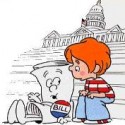So now you can pay Netflix $7.99 a month and stream all the video you want? Damn cool if you ask me!
What does the Netflix decision mean for consumers—two words: More choice! This is what functional markets deliver. There was a time when if you missed an episode of your favorite show, that was it. You might have gotten lucky and caught it on its single rerun, but that was hit or miss. These days, I can watch The Office at 8 p.m. on Thursday nights. Or I can record on my DVR and watch it later that night. Or I can watch it the next day on my PC by visiting nbc.com. Or I can watch it on-demand from my cable box. Or I can wait a few months and watch it on DVD. Or, soon, via Netflix stream.
I can’t help but wonder if this makes moot all the handwringing about the FCC’s desire to place conditions on the online services a merged Comcast-NBC Universal can offer. Come on, Netflix has blown up the whole cable TV model. Continue reading →
On November 18, the Senate Judiciary Committee unanimously approved the “Combating Online Infringements and Counterfeits Act” (COICA). The bill would enable the U.S. Attorney General to obtain a court order disabling access to web domains that are “dedicated to infringing activities.”
These “rogue websites” are a real problem, as the website Fight Online Theft explains, so it’s a good thing that Congress is working to address them. However, some of COICA’s provisions raise profound constitutional concerns, and the bill lacks adequate safeguards to protect against the unwarranted suspension of Internet domain names, as the website Don’t Censor the Net argues. The bill also doesn’t provide a mechanism for website operators targeted by the Attorney General to defend their site in an adversary judicial proceeding. This week, a group of over 40 law professors submitted a letter to the U.S. Senate arguing that COICA, in its current form, suffers from “egregious Constitutional infirmities.”
To address these concerns, CEI is urging Congress to amend COICA to provide for more robust safeguards, including: Continue reading →
 I published an opinion piece today at CNET, calling on all tech stakeholders in Washington to stop the pointless quibbling and sniping about net neutrality, reclassification, and other side-show issues. (I’m too depressed to list them here—but see “Fox-Cablevision and the Net Neutrality Hammer” for an example of just how degraded the conversation has become.)
I published an opinion piece today at CNET, calling on all tech stakeholders in Washington to stop the pointless quibbling and sniping about net neutrality, reclassification, and other side-show issues. (I’m too depressed to list them here—but see “Fox-Cablevision and the Net Neutrality Hammer” for an example of just how degraded the conversation has become.)
Instead, why not focus on a positive message, one that has the potential for win-win-win-win? For example, the National Broadband Plan, issued in March, eloquently made the case for a U.S. commitment to universal broadband adoption. Not as a matter of gee-whiz futurism but in the interest of giving Americans “a better way of life.”
Continue reading →
The Federal Communications Commission has established a new advisory group called the “Technological Advisory Council.” Among other things it will advise the agency on “how broadband communications can be part of the solution for the delivery and cost containment of health care, for energy and environmental conservation, for education innovation and in the creation of jobs.”
This is an agency that is radically overspilling its bounds. It has established goals that it has no proper role in fulfilling and that it has no idea how to fulfill. As we look for cost-cutting measures at the federal level, we could end the pretense that communications industry should be regulated as a public utility. Shuttering the FCC would free up funds for better purposes such as lowering the national debt or reducing taxes.
As we enter day 5 of the standoff between Cablevision and News Corp. over the retransmission of local Fox stations, the controversy over a supposed net neutrality violation has died down, but pressure on the FCC to interfere with the parties’ negotiations [is mounting](http://voices.washingtonpost.com/posttech/2010/10/pressure_mounting_for_fcc_to_i.html). Sen. Kerry has also released a [draft bill](http://techliberation.com/wp-content/uploads/2010/10/kerry-retrans-bill.pdf) [PDF] that would reform the Cable Act’s retransmission consent rules to force TV stations to accept FCC mediation and allow carriage of their signals during a contract dispute.
It’s almost ironic that some would call for more FCC interference to solve a problem that is at least partly caused by FCC regulation. Cablevision is in New York, and what it wants is to carry Fox programming. The local Fox stations, owned and operated by News Corp., are demanding what Cablevision considers too high a price. So why wouldn’t Cablevision just turn to a Fox affiliate in Michigan for the content? The answer is that FCC regulations authorized by the Cable Act take that excellent bargaining chip away from video providers. Continue reading →
 When the only tool you have is a hammer, as the old cliché goes, everything looks like a nail.
When the only tool you have is a hammer, as the old cliché goes, everything looks like a nail.
Net neutrality, as I first wrote in 2006, is a complicated issue at the accident-prone intersection of technology and policy. But some of its most determined—one might say desperate—proponents are increasingly anxious to simplify the problem into political slogans with no melody and sound bites with no nutritional value. Even as—perhaps precisely because—a “win-win-win” compromise seems imminent, the rhetorical excess is being amplified. The feedback is deafening.
In one of the most bizarre efforts yet to make everything be about net neutrality, Public Knowledge issued several statements this week “condemning” Fox’s decision to prohibit access to its online programming from Cablevision internet users. In doing so, the organization claims, Fox has committed “the grossest violations of the open Internet committed by a U.S. company.”
This despite the fact that the open Internet rules (pick whatever version you like) apply only to Internet access providers. Indeed, the rules are understood principally as a protection for content providers. You know, like Fox. Continue reading →
Today’s hot topic is that thousands of Cablevision customers in New York were faced with blacked out News Corp. channels, including Fox, when the two companies were not able to come to an agreement on fees. As a result, Cablevision did not carry the Giants-Lions game and may not carry the next game against the Cowboys. Glee on Tuesday is certainly threatened, and I feel for Cablevision because I wouldn’t wish a spurned Glee fan’s wrath on anyone.
The beautiful thing about this event is that the FCC has put out a Consumer Advisory enumerating all the various choices available to consumers. They can switch to a different pay service, and the FCC counts five: “AT&T, DIRECTV, DISH Network, RCN (limited areas of Brooklyn), and Verizon FIOS.” They can also tune in via over-the-air (rabbit ears) broadcast.
This hasn’t stopped Congress or “consumer advocates” from going apoplectic over American’s god-given right to the Simpsons. And, since it seems News Corp. cut access to Fox shows on Hulu.com and Fox.com for Cablevision internet service subscribers, they fear this is terrible violation of net neutrality.
Let’s put aside for a moment whether it’s a net neutrality violation or not since it’s difficult to tell what that means. (Notice that in this case is not big telecom carriers blocking access to content they don’t like, it’s a content provider blocking an ISP.) What exactly is the problem here?
Given that the FCC has helpfully pointed out all the options available to Consumers, there’s little chance that a consumer who wants to get Fox content won’t be able to do so. If Cablevision and News Corp. don’t come to an agreement, and Cablevision doesn’t carry Fox, consumers who value Fox will switch to a different service. The same goes for Internet service. The important issue here is not a universal human right to content or a net neutrality principle, but choice.
As long as there is market competition and consumer choice, we don’t need the FCC or Ed Markey to ensure that the we’ll get the Giants and the Cowboys in HD and Glee on Fox.com.
Many of the installments of our ongoing ”Problems in Public Utility Paradise” series here at the TLF have discussed the multiple municipal wi-fi failures of the past few years. Six or so years ago, there was quixotic euphoria out there regarding the prospects for muni wi-fi in numerous cities across America — which was egged on by a cabal of utopian public policy advocates and wireless networking firms eager for a bite of a government service contract. A veritable ‘if-you-build-it-they-will-come’ mentality motivated the movement as any suggestion that the model didn’t have legs was treated as heresy. Indeed, as I noted here before, when I wrote a white paper back in 2005 entitled “Risky Business: Philadelphia’s Plan for Providing Wi-Fi Service,” and kicked it off with the following question: “Should taxpayers finance government entry into an increasingly competitive, but technologically volatile, business market?,” I received a shocking amount of vitriolic hate mail for such a nerdy subject. But facts are pesky things and the experiment with muni wi-fi has proven to be even worse than many of us predicted back then.
A new piece by Christopher Mims over at MIT’s Technology Review (“Where’s All the Free Wi-Fi We Were Promised?“) notes that “no technology happens in a vacuum, and where the laws of the land abut the laws of nature, physics will carve your best-laid plans into a heap of sundered limbs every time.” He continues, “the failure of municipal WiFi is an object lesson in the dangers of techno-utopianism. It’s a failure of intuition — the sort of mistake we make when we want something to be right.” Too true. Mims was inspired to pen his essay after reading a new paper, “A Postmortem Look at Citywide WiFi“, by Eric M. Fraser, the Executive Director for Research at the Committee on Capital Markets Regulation. “Almost everyone was fooled by the promise of citywide WiFi,” Fraser notes, because of the promise of a “wireless fantasy land” that would almost magically spread cheap broadband to the masses. But, for a variety of reasons — most of which are technical in nature — muni wifi failed. Fraser summarizes as follows: Continue reading →
Since I contributed $10 to the $23 million The Social Network grossed nationally this weekend, I see no reason not to blog some thoughts on the film.
First of all, the movie, which purports to be a history of the founding of Facebook, succeeds wildly as entertainment. As you may have heard by now, the film basically posits that if its founder, Harvard student Mark Zuckerberg, had not been dumped by his girlfriend for questioning the academic credibility of her school, Boston University, Facebook may never have existed at all.
Whether or not the film’s facts are straight on this is another matter. Nonetheless, it is not my purpose to comment extensively on either the film or its veracity, other than to recommend it highly as long as you ingest the story and characters with the copious grains of salt.
But some facts the film depicts are undeniable. The most significant for my purposes here is that the idea that became Facebook was germinated in the fall of 2003, just six years ago, and, as a website, was launched on the Harvard campus in February 2004.
Continue reading →
 My article for CNET News.com this morning analyzes the “leaked” net neutrality bill from Rep. Henry Waxman, chair of the House Energy and Commerce Committee. I put leaked in quotes because so many sources came up with this document yesterday that its escape from the secrecy of the legislative process hardly seems dramatic. Reporters with sources inside Waxman’s office, including The Hill and The Washington Post, expect Waxman to introduce the bill sometime this week.
My article for CNET News.com this morning analyzes the “leaked” net neutrality bill from Rep. Henry Waxman, chair of the House Energy and Commerce Committee. I put leaked in quotes because so many sources came up with this document yesterday that its escape from the secrecy of the legislative process hardly seems dramatic. Reporters with sources inside Waxman’s office, including The Hill and The Washington Post, expect Waxman to introduce the bill sometime this week.
The CNET article goes through the bill in some detail, and I won’t duplicate the analysis here. It is a relatively short piece of legislation that makes limited changes to Title I of the Communications Act, giving the FCC only the authority it needs to implement “core” regulations that would allow the agency to enforce violations of the open Internet principles. Continue reading →




 The Technology Liberation Front is the tech policy blog dedicated to keeping politicians' hands off the 'net and everything else related to technology.
The Technology Liberation Front is the tech policy blog dedicated to keeping politicians' hands off the 'net and everything else related to technology.